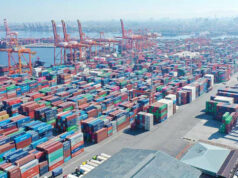THE European Union (EU) is set to commit 170 million euros (P10.8 billion) in aid to the Philippines on top of the 260 million euros it has committed and partly implemented in various local projects once financial agreements are signed.
Stefano Manservisi, director-general for development cooperation of the European Commission, confirmed the total during a news conference on Friday at the EU office in Makati City.
“We have an ongoing commitment of 260 million euros… some of them are actually contracted, shall we say, in implementation,” he said.
“What is next (to be) committed in additional money is 170 million [euros] which then we have to, together with the government, decide what to do,” he added, with the focus to be on the energy sector and in Mindanao.
Mr. Manservisi is on his Manila leg of a visit to countries in the region and has met with Finance Secretary Carlos G. Dominguez III, and National Economic and Development Authority Director-General Ernesto M. Pernia to discuss development cooperation with the EU.
He also said he met with Edgardo J. Angara, special envoy of President Rodrigo R. Duterte to the EU, and Senate President Aquilino D. Pimentel III.
“But with this 170 million we can add many other millions of euros, 30, 40, 50 million depending on the project to be implemented through investment with the Asian Development Bank, World Bank and other multilateral development banks,” he said.
Mr. Manservisi said EU and the Philippines have to sign a financial agreement, which is a requirement for all contracts the bloc enters into.
“We will need this in order to go on and I hope that the discussions that I had in particular with Secretary Dominguez and also with all the other secretaries were precisely to solve the issues which are still to be addressed in the framework of one financial agreement among many,” he said.
Mr. Manservisi said the two parties to the agreement have been trying to reflect the Partnership and Cooperation Agreement (PCA) between them into the financial agreement.
On March 1, the PCA came into effect after the ratification by the Philippine Senate on Jan. 22, 2018. The agreement will provide a new and enhanced legal framework, enabling the EU and the Philippines to strengthen their bilateral relationship on political, social and economic matter, including human rights.
He declined to comment on the Philippine president’s position of turning down EU aid with conditions, by saying: “I will not comment on what the President of the country is saying. It’s not my role. I’m not entitled to do it.”
The agreement is not “unilateral” and will have a mechanism for discussion and consultation that the parties can invoke if either one has a “serious concern” on the implementation, he said.
Sought for comment, Mr. Pernia said EU aid to the Philippines will continue, including the 6-million euro trade-related assistance that was rejected by the country.
“That will come through,” he said. “We have good relations with the EU. Like friends, sometimes you have misunderstandings, but most of the time you have good relations.”
Separately, the Department of Energy (DoE) said three off-grid areas in Mindanao and Bohol have been chosen as pilot sites for collaboration involving the agency, National Electrification Administration (NEA) and the EU’s Access to Sustainable Energy Program.
The DoE and NEA presented the program intended to put in place small renewable energy-based applications to spur economic development in host areas and the environs, the department said in a statement on Friday. — Victor V. Saulon



